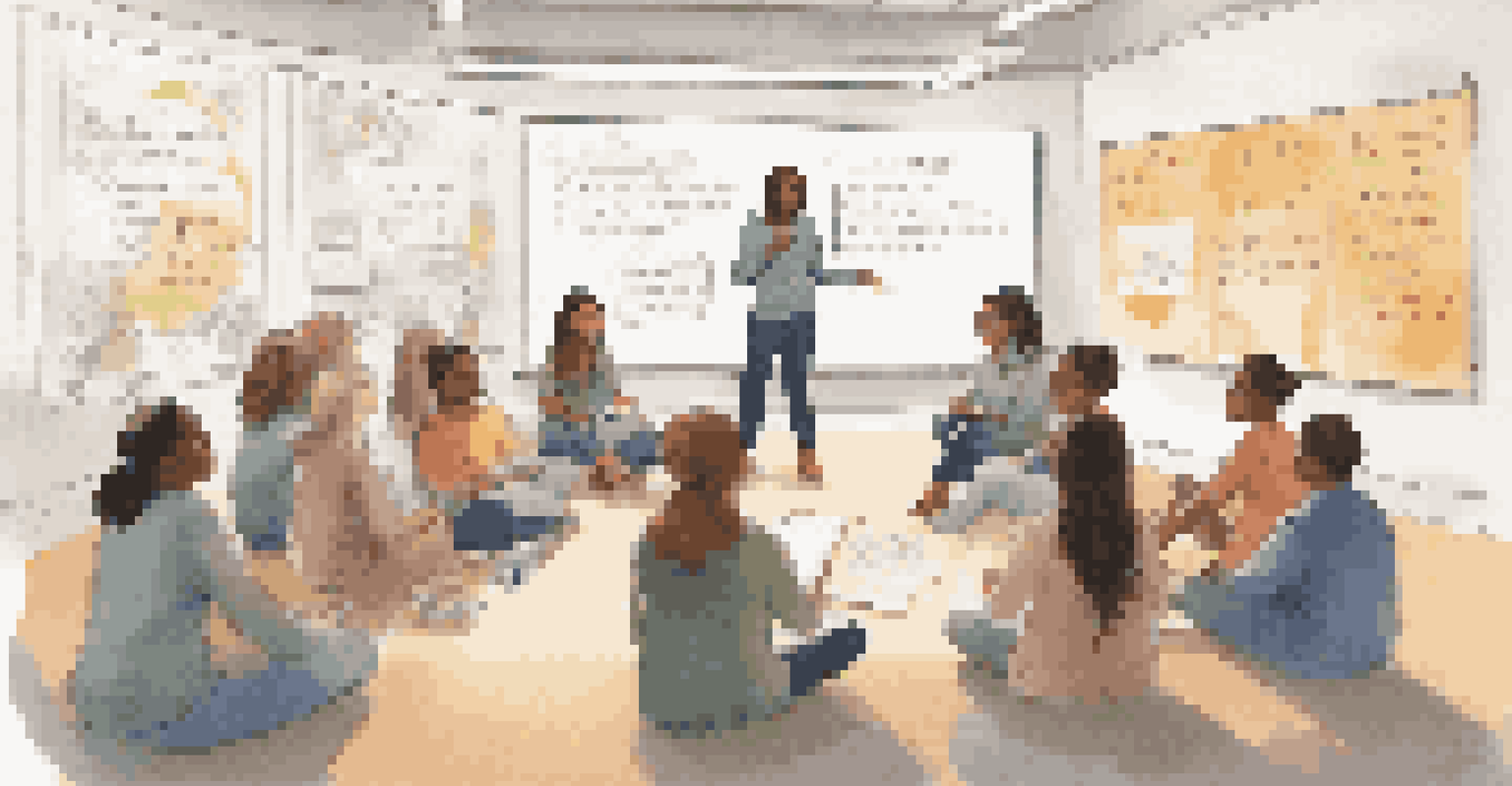Inquiry and Collaboration: Enhancing Learning Through Teamwork

Understanding Inquiry-Based Learning in Teams
Inquiry-based learning places students at the center of the educational process. This approach encourages curiosity and critical thinking, allowing students to ask questions and explore topics deeply. When students collaborate, they can share diverse perspectives, enriching the learning experience for everyone involved.
The greatest gifts you can give your children are the roots of responsibility and the wings of independence.
For instance, consider a science project where students investigate local ecosystems. By working together, they can pool their observations and findings, leading to a more comprehensive understanding of the subject. This teamwork not only fosters curiosity but also develops essential communication skills.
Ultimately, inquiry-based learning in a collaborative environment boosts engagement and retention. Students who work as a team are more likely to feel invested in their learning, making the educational journey more enjoyable and effective.
The Role of Collaboration in Learning Environments
Collaboration is a powerful tool in any learning environment. It promotes an atmosphere where students feel supported and valued, encouraging them to express their thoughts freely. This sense of belonging can lead to increased motivation and a willingness to take risks in their learning.

Take group discussions, for example. When students share their ideas and listen to others, they not only build on each other's knowledge but also develop empathy and respect for different viewpoints. This interaction helps create a more inclusive environment where everyone feels heard.
Inquiry-Based Learning Empowers Students
This approach places students at the center of their education, fostering curiosity and critical thinking through collaborative exploration.
Moreover, collaboration prepares students for real-world situations. As they learn to work with others, they develop crucial skills like teamwork, problem-solving, and adaptability, which are essential in both academic and professional settings.
Benefits of Inquiry and Collaboration for Students
When students engage in inquiry and collaboration, they reap numerous benefits that enhance their learning outcomes. These benefits include improved critical thinking skills, deeper understanding of content, and a greater ability to apply knowledge in real-world situations. Together, these elements create a stronger foundation for lifelong learning.
Alone we can do so little; together we can do so much.
Consider a history project where students research different perspectives on a significant event. By collaborating, they can challenge each other's assumptions and delve into the complexities of the topic. This not only enriches their understanding but also encourages them to think critically about information sources.
In essence, inquiry and collaboration empower students to take ownership of their learning. They become more independent thinkers, ready to tackle challenges both in and out of the classroom.
Creating a Collaborative Learning Culture
Building a collaborative learning culture requires intentionality and effort from educators. It starts by establishing norms that promote respect, open communication, and active participation. When students know what is expected of them in a group setting, they are more likely to engage positively with their peers.
Teachers can foster this culture by modeling collaborative behaviors themselves. By demonstrating how to ask questions, listen actively, and provide constructive feedback, educators set the tone for effective teamwork. This modeling helps students develop the skills they need to work well together.
Collaboration Enhances Learning Outcomes
Working together in groups promotes a sense of belonging and develops essential skills like teamwork and problem-solving.
Additionally, providing structured opportunities for collaboration is crucial. Activities like group projects, peer reviews, and cooperative learning exercises encourage students to interact and learn from one another, reinforcing the collaborative culture.
Strategies for Enhancing Inquiry and Collaboration
To maximize inquiry and collaboration in the classroom, educators can implement several effective strategies. One approach is to incorporate technology, such as collaborative online tools, that allows students to work together seamlessly, even from different locations. This can be particularly beneficial in today’s increasingly digital world.
Another strategy is to encourage project-based learning, where students tackle real-world problems in groups. This method not only promotes collaboration but also allows students to engage in inquiry as they explore solutions together. It fosters a deeper understanding of content while developing essential teamwork skills.
Finally, regular reflection on group work experiences can enhance the learning process. Encouraging students to discuss what worked well and what could improve helps them develop self-awareness and refine their collaborative skills for future projects.
Assessing Collaborative Learning Outcomes
Assessing collaborative learning outcomes can be challenging, yet it's essential for understanding the effectiveness of teamwork in education. Educators can use various methods, such as peer evaluations, self-assessments, and group reflections, to gather insights into students' collaborative experiences. These assessments provide valuable feedback on both individual contributions and overall group dynamics.
For example, peer evaluations can help students recognize their strengths and areas for growth in teamwork. They learn to appreciate different roles within a group, fostering a sense of accountability. This not only enhances the collaborative experience but also prepares students for future teamwork in their careers.
Future Focus on Project-Based Learning
As education evolves, there will be an increased emphasis on collaboration and inquiry through project-based and technology-integrated learning.
Moreover, assessing collaborative learning outcomes helps educators refine their teaching strategies. By analyzing feedback, they can identify areas where students may need additional support or skills training, ultimately leading to a more effective learning environment.
The Future of Inquiry and Collaboration in Education
As education continues to evolve, the importance of inquiry and collaboration is becoming increasingly clear. In a world that values innovation and creativity, these skills are essential for preparing students for future challenges. By fostering a collaborative learning environment, educators are equipping students with the tools they need to succeed.
Looking ahead, we can expect to see more emphasis on project-based learning, interdisciplinary approaches, and technology integration in classrooms. These trends will further enhance inquiry and collaboration, making learning more engaging and relevant for students. They will be better prepared to tackle complex problems and work effectively in diverse teams.

In conclusion, the future of education lies in nurturing inquiry and collaboration. By prioritizing these elements, we can create a generation of learners who are not only knowledgeable but also capable of working together to drive positive change in the world.